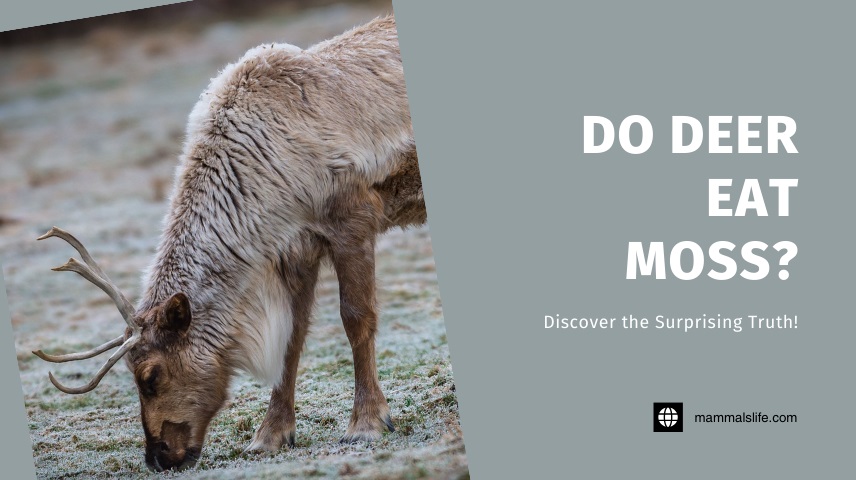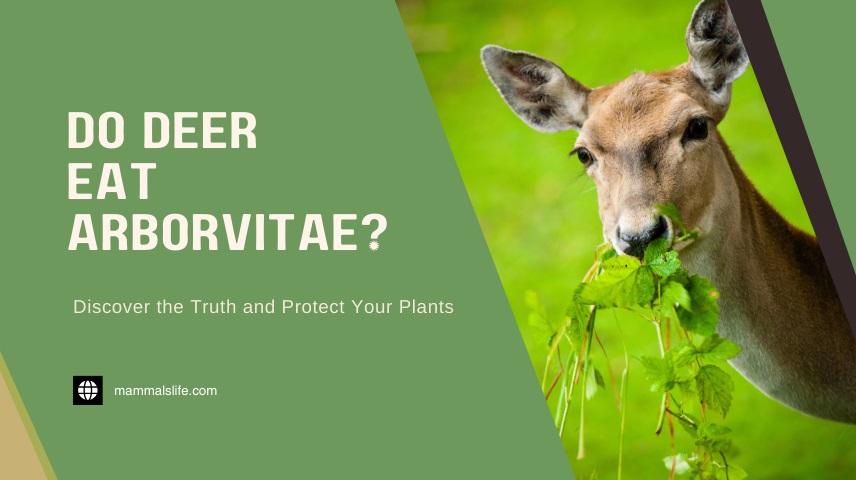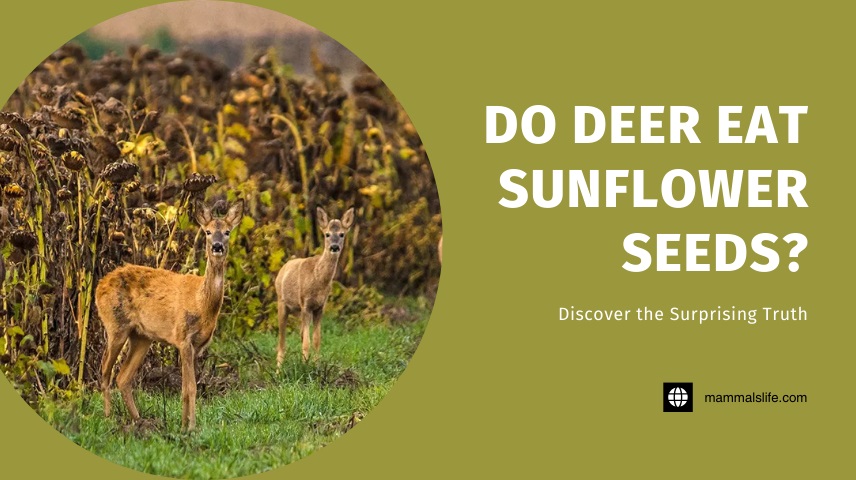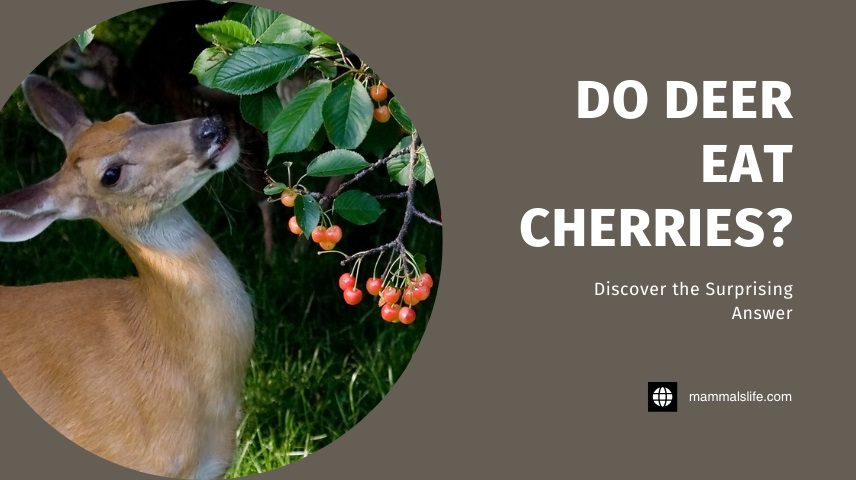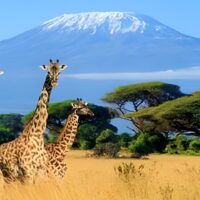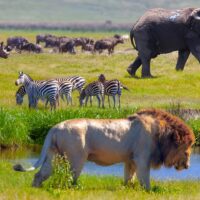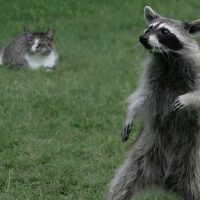Last Updated on February 22, 2025 by Mammals Life
Yes, deer eat moss. Moss can be a food source for deer, especially in winter when other foods are scarce.
Deer are herbivores and have a diverse diet. They consume various plants, leaves, and even bark. Moss becomes an important part of their diet, particularly during colder months. In winter, food sources diminish, and moss provides necessary nutrients. Deer forage for moss in forests and shaded areas.
This dietary adaptation helps them survive harsh conditions. Understanding deer eating habits can aid in wildlife management and conservation efforts. Deer play a crucial role in ecosystems, and their food choices impact vegetation. Recognizing what deer eat helps in creating balanced habitats.
Introduction To Deer Diet
Deer are fascinating creatures with diverse diets. Understanding their food preferences helps in wildlife management. Deer diets change with the seasons and habitat.
Common Foods
Deer eat a variety of plants. They prefer browsing on leaves, twigs, and shrubs. Grasses and herbs are also common in their diet. In forests, deer consume acorns, nuts, and fruits.
- Leaves
- Twigs
- Shrubs
- Grasses
- Herbs
- Acorns
- Nuts
- Fruits
Seasonal Variations
Deer diets change with the seasons. In spring and summer, they eat fresh green plants. During fall, they consume acorns and nuts. In winter, food is scarce, so they eat twigs and bark. Moss becomes part of their diet in harsh winters.
| Season | Common Foods |
|---|---|
| Spring | Fresh Green Plants |
| Summer | Leaves, Twigs, Shrubs |
| Fall | Acorns, Nuts, Fruits |
| Winter | Twigs, Bark, Moss |
Understanding these patterns helps in conserving deer habitats. It ensures they have enough food year-round.
What Is Moss?
Moss is a small, non-vascular plant found worldwide. It thrives in damp, shady areas. Moss lacks flowers and seeds. It reproduces through spores. This green, carpet-like plant adds a natural touch to landscapes.
Types Of Moss
There are several types of moss. Some common types include:
- Sphagnum Moss: Found in bogs and wetlands. It holds water well.
- Sheet Moss: Grows on soil and rocks. It forms dense mats.
- Cushion Moss: Looks like small, green cushions. It grows in dry areas.
- Feather Moss: Has a feathery appearance. It thrives in forests.
Nutritional Value
Moss offers some nutritional benefits. It contains:
- Fiber: Helps digestion.
- Minerals: Includes calcium and potassium.
- Vitamins: Small amounts of vitamins A and C.
Deer may eat moss. They do this when food is scarce. Moss offers limited nutrition. Yet, it helps deer survive harsh conditions.
Deer And Moss: A Rare Encounter
Deer are known for their diverse diet. They eat leaves, twigs, and fruits. But what about moss? You might wonder if deer ever eat moss. Let’s explore this unusual dietary choice.
Observations In The Wild
In the wild, deer have a variety of food options. They prefer plants that are rich in nutrients. Observers have noted that deer rarely eat moss. Moss lacks the nutrients deer need. Instead, deer often choose leafy plants and shrubs.
Deer might eat moss in extreme conditions. During harsh winters, food becomes scarce. In these times, deer may eat moss to survive. Yet, this is not common behavior.
Scientific Studies
Scientific studies support these observations. Researchers have analyzed deer diets. Studies show that moss is not a primary food source. Deer stomach contents rarely contain moss. Most often, they find leaves, twigs, and seeds.
| Food Item | Occurrence in Deer Diet |
|---|---|
| Leaves | High |
| Twigs | Medium |
| Moss | Low |
Why don’t deer eat moss often? It’s simple. Moss doesn’t provide the energy deer need. It lacks essential nutrients like proteins and fats.
Researchers also studied deer behavior. They found that deer are selective eaters. They choose foods that help them thrive. Moss is not one of those foods.
In summary, deer eating moss is a rare sight. They prefer nutrient-rich plants over moss. Only in tough times might they turn to moss.
Factors Influencing Deer Diet
Deer have a varied diet that depends on several factors. Understanding these factors helps explain their eating habits. Let’s explore some key aspects.
Availability Of Food
Deer eat what is available to them. In summer, they find plenty of green plants. During winter, food becomes scarce. This forces them to eat twigs, bark, and even moss.
Deer prefer certain foods. They like tender shoots, leaves, and berries. But, they will eat moss if nothing else is available. Food availability greatly shapes their diet.
Environmental Conditions
Weather and climate impact deer diet. In colder months, snow covers the ground. Deer struggle to find food and may eat moss.
In dry seasons, plants wither and die. Deer eat whatever they can find, including moss. Environmental conditions play a big role in what deer eat.
Moss In Deer Habitats
Deer are adaptable creatures. They thrive in various environments, including forests and mountains. A common question is: Do deer eat moss? To understand this, let’s explore moss in deer habitats.
Forest Ecosystems
In forest ecosystems, moss is abundant. It grows on trees, rocks, and the forest floor. Deer are often seen in these areas. They nibble on moss when other food is scarce. Moss provides some nutrients, but it’s not their primary food.
Forests provide a diverse diet for deer. They eat leaves, twigs, and herbs. Moss becomes a food source in tough times. Here is a table showing deer food preferences in forests:
| Food | Availability |
|---|---|
| Leaves | High |
| Twigs | Medium |
| Moss | Low |
Mountainous Regions
Mountainous regions have different challenges. Food is less abundant. Moss is more common here. Deer eat moss to survive in harsh conditions. It’s a crucial part of their winter diet.
Deer also eat lichens and woody plants in mountains. These provide more nutrients than moss. Here is a list of foods deer eat in mountainous regions:
- Moss
- Lichens
- Woody plants
- Grasses
Deer adapt to their environment. Their diet changes with the seasons. In mountains, moss becomes essential during winter.
Frequently Asked Questions
Do Deer Eat Moss In The Wild?
Yes, deer do eat moss in the wild, especially during winter when other food sources are scarce.
Why Do Deer Consume Moss?
Deer consume moss for its moisture and nutrients, particularly in harsh conditions when other vegetation is unavailable.
Is Moss A Primary Food For Deer?
No, moss is not a primary food source for deer. They prefer leaves, twigs, and other vegetation.
Does Moss Provide Nutritional Benefits To Deer?
Yes, moss offers some nutritional benefits, including moisture and essential minerals, helping deer survive in challenging environments.
Conclusion
Deer do eat moss, especially when other food is scarce. Moss provides essential nutrients for their diet. Understanding deer eating habits helps in wildlife management. Protecting mossy areas can support deer populations. Observing deer behavior offers insights into their ecological impact.

